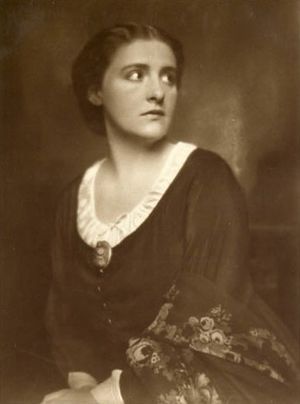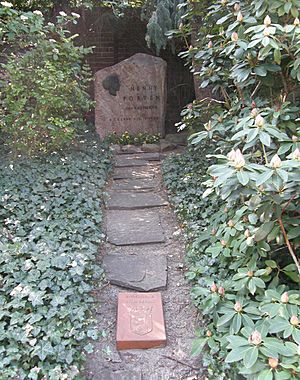Henny Porten facts for kids
Frieda Ulricke "Henny" Porten (born January 7, 1890 – died October 15, 1960) was a famous German actress. She was also a film producer. Henny Porten was one of the first big movie stars in Germany, especially during the silent movie era. She acted in over 170 films. Her career lasted from 1906 to 1955.
Contents
Henny Porten's Early Life and Career
Frieda Ulricke Porten was born in Magdeburg, which was part of the German Empire at the time. Unlike many actors back then, she started in movies without first performing on stage. Her father, Franz Porten, was also an actor and film director. Her older sister, Rosa Porten, was involved in films too.
Many of Henny's early movies were directed by her first husband, Curt A. Stark. Sadly, he passed away during World War I in 1916. He was fighting on the Eastern Front in Transylvania.
Becoming a German Film Star
In the 1910s, Henny Porten worked a lot in movies. She quickly became one of Germany's first major film stars. She shared this fame with another actress named Asta Nielsen.
In 1919, Henny started her own film production company. This company later joined with Carl Froelich's company in 1924. That same year, she starred in Irrungen, a film that looked at social problems. She also acted in Rose Bernd, based on a play by Gerhart Hauptmann.
In 1920, she had great success with films directed by Ernst Lubitsch. These included Anna Boleyn, where she starred with Emil Jannings, and Kohlhiesels Töchter. She continued to work with famous directors in 1921. Some notable films were Die Geierwally, directed by Ewald André Dupont, and Hintertreppe (1921), by Leopold Jessner. In 1923, she appeared in I.N.R.I., directed by Robert Wiene. She also starred in Gräfin Donelli (1924), directed by Georg Wilhelm Pabst.
Henny Porten and Sound Films
At first, Henny Porten was not sure about movies with sound. But she eventually started working with this new technology. Her first sound film was Skandal um Eva, released in 1930.
Challenges During the Nazi Era
On June 24, 1921, Henny married her second husband, Wilhelm von Kaufmann. He was a doctor of Jewish background. He later took over producing Henny's films.
When the Nazis came to power in Germany, they wanted Henny to divorce her Jewish husband. She refused to do so. Because of her choice, her acting career suffered greatly. She used to make about twelve films a year, but this stopped almost immediately.
She wanted to leave Germany, but the Nazis would not let her. They did not want her leaving to create a bad image for them. Despite the difficulties, she made ten films during the Nazi era. Her calm and comforting presence on screen helped audiences feel better during the Allied bombings. In 1944, her home was destroyed by a bomb. She and her husband were left without a place to live. It was forbidden to shelter a Jewish person at that time.
After World War II, Henny Porten worked for the DEFA studios. She passed away in Berlin, Germany, in 1960. She was buried in the Kaiser-Wilhelm-Gedächtnis Cemetery in Berlin. In 1960, she received the Order of Merit of the Federal Republic of Germany, a high honor.
Henny Porten's Rise to Fame
Henny Porten first appeared in a movie called The Porcelain of Meissner in 1906. It was a small role in a very short silent film. Her father, Franz Porten, directed it for Oskar Messter.
In 1907, after finishing her studies, Henny became a professional actress. She worked with a company called Deutsche Mutoskop und Biograph GmbH. Later, she signed a special contract with Oskar Messter. She starred in his film Lohengrin (1910). This movie was based on an opera by Richard Wagner. Even though her early films were not huge box office hits, her striking looks and natural acting style drew people in.
Becoming Germany's First Diva
Henny became the first "diva" (a very famous and admired female star) in German cinema with the film The Love of a Blind Girl (1910). In 1912, she appeared in Love Masked. This was the first full-length movie from Messters-Projection GmbH. She went on to make about one hundred more films by 1918. Because of this, her name is closely connected to the growth of the German film industry.
"Messter's Girl" and Her Name
Early German film producers often kept actors' names secret. They worried that if actors became famous, they would ask for more money. So, Henny Porten was not known by her real name. Instead, people called her "the Messter's girl" because she worked for Oskar Messter.
However, in 1910, Henny starred in the drama The Love of a Blind Girl. She was so successful that Messter had to tell the public her name. As soon as her name was known, Henny asked for a raise!
Henny Porten's Film Roles
The characters Henny Porten played in her films often felt very real to people. They were like characters from everyday life. German viewers could easily relate to them. Her stories often came from popular magazine serials. Because of this, some artistic and intellectual people called her "the star of the common people." They saw her as a symbol of what the upper class looked down on. Henny Porten kept playing these types of roles from 1910 until silent films ended.
Henny Porten often played women who found happiness in helping others. These characters sometimes sacrificed their own wishes. Her films showed the challenges women faced in society. They also showed how women with relationships outside marriage or single mothers were sometimes excluded. The movies also highlighted unfair competition between men and women at work.
Selected Filmography
- No Sin on the Alpine Pastures (1915)
- The Robber Bride (1916)
- The Queen's Love Letter (1916)
- The Wandering Light (1916)
- Imprisoned Soul (1917)
- Mountain Air (1917)
- The Princess of Neutralia (1917)
- The Giant's Fist (1917)
- The Marriage of Luise Rohrbach (1917)
- Countess Kitchenmaid (1918)
- The Victors (1918)
- Precious Stones (1918)
- The Blue Lantern (1918)
- The Ringwall Family (1918)
- Agnes Arnau and Her Three Suitors (1918)
- The Lady, the Devil and the Model (1918)
- Put to the Test (1918)
- The Homecoming of Odysseus (1918)
- Her Sport (1919)
- Ruth's Two Husbands (1919)
- A Drive into the Blue (1919)
- The Living Dead (1919)
- Rose Bernd (1919)
- Anna Boleyn (1920)
- The Golden Crown (1920)
- Monika Vogelsang (1920)
- Kohlhiesel's Daughters (1920)
- The Vulture Wally (1921)
- Backstairs (1921)
- She and the Three (1922)
- The Ancient Law (1923)
- Inge Larsen (1923)
- I.N.R.I. (1923)
- The Love of a Queen (1923)
- The Secret of Brinkenhof (1923)
- The Merchant of Venice (1923)
- Countess Donelli (1924)
- Prater (1924)
- Mother and Child (1924)
- The Adventures of Sybil Brent (1925)
- Tragedy (1925)
- The Golden Calf (1925)
- Chamber Music (1925)
- When She Starts, Look Out (1926)
- Roses from the South (1926)
- The Flames Lie (1926)
- The Long Intermission (1927)
- My Aunt, Your Aunt (1927)
- Lotte (1928)
- Love in the Cowshed (1928)
- Violantha (1928)
- Escape (1928)
- The Woman Everyone Loves Is You (1929)
- German Wine (1929)
- A Mother's Love (1929)
- The Mistress and her Servant (1929)
- Scandalous Eva (1930)
- Kohlhiesel's Daughters (1930)
- Louise, Queen of Prussia (1931)
- 24 Hours in the Life of a Woman (1931)
- Mother and Child (1934)
- Trouble Backstairs (1935)
- The Comedians (1941)
- When the Young Wine Blossoms (1943)
- The Buchholz Family (1944)
- Marriage of Affection (1944)
- Unknown Sender (1950)
- Carola Lamberti – Eine vom Zirkus (1954)
- Das Fräulein von Scuderi (1955)
See also
 In Spanish: Henny Porten para niños
In Spanish: Henny Porten para niños



